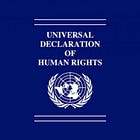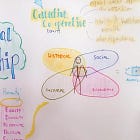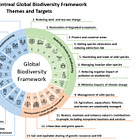Good Governance
The way to maneuvre initiatives about unnoticed in diplomatic, international affairs is through the use of abstract, opaque, seemingly meaningless language. Moral. Fair. Human Dignity. Ethic. Social Justice. Good Society. Human Rights… Good Governance.
Because while you do tend to have some vague idea of what such comprise, you don’t generally look further for answers. And that’s awfully convenient, especially if you have something major to hide to pull off a fast one… on the world.
Of course, should you decide to actually look further, you’ll often be taken on a 3 mile journey around the topic itself, only to frequently arrive back… where you started - sort of like a dodgy cab driver who halfway through scamming you mixed up your destination and your origin. ‘Human rights’ is a great example in that regard. The most famous related document is the 1948 Universal Declaration on Human Rights1, considered a foundational document of the United Nations, though should you read it… you’ll find it chock full of vague language expressing abstract, good-willed intent, but with no firm description on how to get there. The UDHR, however, through Article 29 somewhat hints at darker motives at play.
Because the concept of ‘human rights’ will increasingly evolve to emphasize ‘responsibilites’, and when these are viewed through the prism of the ‘rights of others’ this shift subtly seeks to curtail your rights and consequently individual freedoms. And that dynamic can be described through conceptual ‘interdependence’ - which in brief is synonymous with collectivism. Consequently, this ultimately becomes of matter of harmonising personal liberties with ‘communal well-being’, and hence ultimately becomes a matter of ethics and morality.
Rights and responsibilities serve as the two foundational pillars of ‘social justice’. Further, you might also hear these referred to through the expressions ‘distributive justice’ - which relates to the equal sharing of resources - and ‘contributive justice’ - emphasising that everyone should contribute to the best or their ability. And this principle is succinctly captured through the well-known phrase, ‘from each according to his ability, to each according to his needs‘. And these two concepts not only serve to uphold ‘human dignity’ - ensuring that everyone is treated with respect - but ultimately also the ‘common good’, which aims to improve ‘well-being’ for the entire community.
The concept of ‘human dignity’ is closely tied to the framework established by distributive, contributive, and commutative justice - and embracing this framework enables people to ‘Live with Dignity’. As for ‘equity’ - that’s the balance between contributive and distributive justice, ensuring that each person contributes ‘from each according to his ability, to each according to his needs‘. However, should you fail to ‘live with dignity’, then the relevance of equity as applied to you becomes irrelevant.
And the concept of our 'common good' ultimately means serving society in a manner consistent with ethical principles, derived from common purpose. Thus, you don't technically serve the purpose itself, but rather the ethics established to facilitate the achievement of said common purpose.
And ‘ethics’… that’s the issue, really, because everything you see around you appears justified through the lens of said - even up to and including Global Governance.
And the contemporary drive for Global Governance as dictated through the setting of Global Ethics - this saw its public launch in 1993 through Hans Kung and the 1993 Parliament of the World’s Religions.
I should also mention two further terms - ‘intergenerational justice’, and ‘contextual reality’. The former derives from historical materialism, and pertains to the fairness and responsibilities shared between different generations. The latter concerns the practical application of these principles in a contemporary setting, and thus - intergenerational justice viewed through the lens of contextual reality leads to ‘intergenerational equity’.
And in event it wasn’t completely obvious what I outlined above - and in light of the famous quote above being delivered by Karl Marx himself - every aspect of the above discussion is informed by a…
Marxist approach to Social Justice.
But yet another of these incredibly deceptive terms has as of yet gone undeciphered, and that’s the objective of this article. It’s the principles of ‘Good Governance’ which appear inserted… into just about every document published by the highest authorities. But these principles in fact trace back to 1992 and the World Bank’s report titled ‘Governance and Development‘2 -
‘Good governance is an essential complement to sound economic policies. Efficient and accountable management by the public sector and a predictable and transparent policy framework are critical to the efficiency of markets and governments, and hence to economic development. The World Bank's increasing attention to issues of governance is an important part of our efforts to promote equitable and sustainable development.‘
Upon encounter, you might have a gut feel that this relates to corruption in the 3rd world, and sure - there’s probably some legitimacy in that regard. But the real question does not actually relate to said, hypothetical 3rd world nation. The real question relates to the World Bank. Exactly what does this framework comprise?
‘The Bank's experience has shown that the programs and projects it helps finance may be technically sound. but fail to deliver anticipated results for reasons connected to the quality of government action.‘
There’s the justification, though I doubt it’s applied in reverse. Because the World Bank itself certainly is controversial3.
‘These examples illustrate a broader point: good governance is central to creating and sustaining an environment which fosters strong and equitable development, …‘
As outlined - equity is the delta between contributive and distributive justice, ie, what you contribute and what you receive. But - of course - you will receive no equity unless you live in dignity.
‘This booklet identifies four areas of governance that are consistent with the Bank's mandate: public sector management, accountability, the legal framework for development, and information and transparency.‘
… we will get to these in a minute, but first we observe quite possibly the most important paragraphs in the document -
‘The Bank's work on governance is selective, given the legal and resource constraints it faces, and given the limitations facing any external agency working in areas for which national decisions and government commitment are the fundamental determinants. This in turn implies concentrating Bank efforts in countries where they are most likely to succeed, …‘
….because this is a framework for deciding where development projects are most likely to succeed, which takes us back to said ‘dignity’, and thus -
‘When government commitment to sound development management is in doubt, the Bank's encouragement of ar intensive dialogue on the overall development program can be an important precursor to change. When that dialogue is not fruitful, it inevitably attects the bank's analysis of the country's overall development management and performance, and in turn the nature and extent of Bank support for the country…‘
… this in effect becomes a framework outlining ‘justice’ - those who receive development aid (distributive justice) are those who ultimately comply with the rules (live with dignity).
Most of this report is rather tedious, so let’s skip straight to the summary which goes on to detail -
‘First, from a broader perspective, both history (see above) and the Bank's own experience show that good governance, in the sense that it has been defined here, is central to creating and sustaining an enabling environment for development.‘
Their rules ensuring those 3rd world nations ‘live with dignity’ come down to their rules of ‘good governance’, which we’re about to go through. It carries on by detailing that in the context of public sector management -
‘Until recently…, the Bank has tended to focus narrowly on its own intervention rather than on the country context... It has often encouraged borrowers to introduce new laws and regulations… without always examining whether the legal system as a whole is operational and whether laws will be implemented effectively. This situation has changed rapidly in recent years. Just as the bank's work in public sector management has broadened from strengthening project-related agencies to reforming the civil service‘
… not only have they pushed through regulatory changes, but they have even gone to the extents of reforming the civil service in recipient nations - which all appear a tad more intrusive then you’re first led to believe. In terms of accountability, it… all appears largely above water… we do have ‘encourage beneficiary participation‘, and ‘make selective and focused use of local nongovernmental organizations‘ which through contemporary eyes do beg questions, before the legal framework… in a somewhat wishy-washy manner simply states that the legal framework should somehow be implemented better, which clearly relates to the above reform. Finally we have information and transparency which includes ‘fair contract conditions‘ and ‘training of economic journalists‘, again returning a slight feeling of unease - but all in all, it appears… light, no?
Blink and you’ll miss it. Did you blink?
Because while the brief inclusion of ‘Countrywide accountability assessments and projects have been undertaken in Bolivia, Indonesia, and Madagascar‘ appears contextually trivial it actually stick a bit deeper. Should we head to box 2 on page 18 of the report we find detail on the Indonedian Accountancy Project which states -
‘In the private sector, the accounting system had fallen behind outher skills required in industry and commerce… and lacked detailed accounting and auditing standards, a code of ethics, and disciplinary procedures‘
… that the private sector is woefully short of a good code of ethics. Fortunately we find the World Bank only happy to help -
‘With regard to private sector accounting, the World Bank will support the Indonedian Instutute of Accountants… accounting principles and auditing standards will be formulated for more consistent financial reporting… and a code of ethics will be developed‘
… which in other words mean that the World Bank will create a ‘code of ethics’, which so obviously will be included through said ‘Good Governance’ principles down the line - and should a recipient nation not ‘live with dignity’, then they’re not entitled to ‘equity’.
Ie, accept our terms, or the deal is off.
The next major update to these principles of ‘Good Governance’ followed in 1997 through ‘Governance for sustainable human development : a UNDP policy document‘4. And we don’t even have to go far before establishing that -
‘Governance includes the state, but trancends it by taking in the private sector and civil society. All three are critical for sustaining human development‘
… and it’s a ‘stakeholder approach’. Who could possibly have predicted.
‘Because each has weaknesses and strengths, a major objective of our support for good governance is to promote constructive interaction among all three‘
… and if said recipient nation won’t accept said, then no ‘equity’ in return. And there isn’t really much more to come for on the following pages, but it is interesting to see the name James ‘Rhodes Scholar’ Speth in this regard, given his past.
We skip to chapter 2 which kicks off with a quote from the 1995 Declaration of the World Summit for Social Development -
‘Democracy and transparent and accountable governance and administration in all sectors qf society are indispensable foundations for the realisation of social and people-centred sustainable development‘
The report continues by outlining stakeholder governance, then goes to detail that the primary task of the UNDP in fact is to ‘build the capacity of good governance’, and this of course goes through the reforms discussed in the World Bank report. But the UNDP now even factors in electoral reform, human rights oversight bodies (with accompanying laws, undoubtedly distributed down from the United Nations itself), and even offers to assist in the develoment of capacity, including that relating to public-private-partnerships, before including that -
‘Crucial elements for sustainable human development include… market regulation and privatisation, social safety nets and resource management.‘
Am I a cynic for suspecting this to be about the opening of 3rd world markets for global enterprises to raid, especially in terms of natural resources?
‘More specifically, UNDP can provide support to build capacity in economic policy analysis, formulation and management, budgeting, economic administrations (customs, debt management and so on), regulatory frameworks and national accounting.‘
… which - per above - is where that ‘code of ethics’ enters the stage. But surprisingly there is no mention of ethics in this document at all. And this appears… odd, given Kofi Annan was busily reforming the United Nations to be more aligned with the ‘stakeholder approach‘ when this report was released.
But as for the reference to the ‘World Summit for Social Development‘5 above, should you investigate you’ll find that it opens by stating -
‘The World Summit for Social Development was, at its time, the largest gathering of world leaders ever assembled. It was attended by more than 14,000 people, include delegates from 186 countries, with 117 represented at the level of Heads of State or Government‘
… and -
‘The World Summit for Social Development was a historic moment, because the Copenhagen Declaration on Social Development and its Programme of Action have guided multilateral action on social development ever since. The Declaration emphasized the eradication of poverty as an ethical, social, political and economic imperative‘
… we have a call for ethics.
The report is absolutely chock full of the buzzwords we’ve come to love. Interdependence, dignity, social justice, tolerance, diversity, equity, human rights, ethical values, civil society, ethical conduct, fair competition, the Universal Declaration of Human Rights, and (Commitment 1) -
‘We commit ourselves to creating an economic political, social, cultural and legal environment that will enable people to achieve social development‘
… which as per above requires adhering to the principles of good governance, which will further impose changes in terms of national election frameworks and even civil service reform - ie, public sector management -
‘… stable legal framework, in accordance with our constititions, laws and procedures, and consistent with international law and obligations, which includes and promotes equality and equity between women and men, full respect for all human rights and fundamental freedoms and the ruile of law, access to justice, the elimination of all forms of discrimination, transparent and accountable governance and administration and the encouragement of partnerships with free and representative organisations of civil society…’
… and there we observe accountability, legal framework, and transparency - thus essentially covering all four principles of good governance, the only missing component thereof is ‘information’… but references to said are scattered all over the documents - 46 in total - with one on only the following page (in blue).
But what’s of primary importance you’ll find on page 9 which suggests the creation of a ‘supportive external economic environment’ - trade liberalisation using all available economic funding sources - implemented in a manner that promotes social development, again an indirect nod in the direction of the principles of good governance simply because you won’t receive any ‘equity’ - unless you accept the terms otherwise described as ‘living with dignity’.
Next follows more promises of the eradication of poverty ‘as an ethical… imperative of mankind’, before cryptically stating that ‘people living in poverty have access to… credit, land… that would enable them to benefit from expanding employment and economic opportunities’, which we will return to in a minute, because what comes next -
‘Supporting African countries… in their efforts to create an enabling environment that attracts foreign and domestic direct investment… promotes the full participation of the private sector, including NGOs…‘
… which of course is yet another call for stakeholder governance -
‘… solutions to external debt problems… debt foregiveness… assist low-income countries… developing techniques of debt conversion‘
… and cut. Do you recognise the above? The latter refers to Debt-for-Nature Swaps, designed to seize the collateral when the debt refinancing eventually fails. Incidentally, as for those living in poverty - the micro-plot owners - they will suffer much the same fate down the line. And these lands will then be sent to the UNESCO Biosphere Reserves, fresh for private equity to monetise through the Global Environment Facility for carbon credits, ultimately to these leases to be floated on the markets through Natural Asset Companies. And that is how their cashing out mechanism works, as detailed in the Grand Plan.
To this extent we also see a call for ‘open market opportunities, especially people living in poverty’, which adds that those in poverty should be encouraged ‘to take economic initiatives’, which means using their land as collateral in exchange for usurious loans. It carries on, calling for ‘fair competition and ethical conduct’, noting that ‘protectionist measures’ should be dismantled, even calling for the establishment of ‘an open market policy that reduces barriers to entry’. I don’t know how much more obvious this can get, though this surely cements it - ‘Supporting and paying special attention to the development of small-scale and micro-enterprises’. Truly - if you don’t get it by now, I don’t know if I can help you. The plan is to seize the pledged collateral - the land - when the loans eventually fail to refinance. And they will, because that’s the express intent.
But before you become angry with those multinational corporations which capitalise on these arrangements, do note that -
‘Encouraging transnational and national corporations to operate in a framework of respect for the environment… with proper consideration for the social and cultural impact of their activities‘
… further asking for -
‘Enacting rules and regulations and creating a moral and ethical climate…‘
… in light of -
‘Promoting fair competition and ethical responsibility in business activities, and enhancing cooperation and interaction among Governments, the private sector and civil society‘
It’s a stakeholder approach, and those multinationals will effectively sign a deal with the Devil through Corporate Social Responsibility, as they will have no impact on the future development of the term ‘ethics’ which will ultimately direct said.
Finally, we have the call ‘re-examining the distribution of subsidies’, likely referring to the imposition of massive dues on oil & gas, which will see your food and energy prices skyrocket - but only, of course, after the fraudulent carbon trading schemes are in place. This is all detailed by Hank Paulson through his institute’s 2021 report, ‘Financing Nature‘.
We continue through E/S/E policies (eventually synthesised through individually tailored carbon credit backed CBDCs - aka a ‘social credit system’), the ‘well-being of people’, the dignity of each individual and the common good, after which we find that not only was the Baha’i International community present, but a representative of the Commission on Global Governance partook as well. And that is of interest, as their report (‘Our Global Neighbourhood’) was the supposed source of Kofi Annan’s reforms in 1997… which brought stakeholder governance into the United Nations system.
The usual claim of us treating planet Earth badly follows, interestingly quoting the year 1968 as opposed to 1969, which could be hypothesised as a nod in the direction of the UNESCO Biosphere Conference which kicked… practically all of this off.
Finally, the Danish Prime Minister at the time - Poul Nyrup Rasmussen - claimed that ‘the summit is at the very heart of all political work and governance’… which is interesting phrasing, because by 1995 this… monstrous creation, eventually seeking to swallow up all land, natural resources, and even rights to breathe was in full motion.
And it’s this creation that you currently sense all around you.
In the article on the Fabian Society, I detailed how Tony Blair through ‘The Third Way’ introduced the stakeholder approach in the United Kingdom in 1997-8.
And Blair further penned Fabian Society Pamphlet 588 on the topic - ‘The Third Way - New Politics for the New Century’ which has so far proven elusive. But as it transpires, Britannica6 of all places has a run-down of said ‘Third Way’, and what do they describe? Public-private-partnerships, civil society organisations, ‘rights come with responsibilities’, Global Governance, and all with a heap of references to ethics; an ethical perspective, a guiding ethic, an ethical standard, an ethical consideration, a social democratic ethos, ethical aspirations, and a third way ethics.
I’m not so sure that’s a coincidence.
And while this was happening in the United Kingdom… and the United Nations through Kofi Annan… the express same development took place in the United States. They, too, had a ‘Third Way’7 revolution, facilitated by the Clintons. They even had a roundtable8 on the Third Way… featuring the Dutch and German Prime Ministers at the time, Wim Kok, and Gerhard Schroeder. And all of these centred around ‘an ethic of mutual responsibility’.
Should you decide to dig deeper, this initiative can be traced further back to ‘The New Progressive Declaration‘9 released in July, 1996. And that declaration covers the ‘moral matter’, which ‘rejects libertarianism’, and which further and rhytimically goes to remind you of your ‘responsibilities’ in relation to your ‘rights’; your ‘human rights’. It even mentions a future ‘social ethic’ which will ‘constitute a very different political purpose and approach to governing from those that prevail today’.
And yes, this document is very real.
That drive for ‘stakeholder’ philosophy can then be traced back further, first to 1991 and ‘THE NEW AMERICAN CHOICE RESOLUTION - Resolutions adopted at the DLC Convention‘10, and ultimately to 1990 and ‘Stakeholding: A New Direction in Social Policy‘11 from where the trail appears to run cold. And - yes - I am aware of Freeman’s 1984 book - what I speak of here is practical implementation at the highest political level. And I would say the 1991 Democratic Convention counts as that. However, should you trace back Freeman further, you’ll end up with Erich Jantsch’s ‘Perspectives on Planning’ from 1968 previously covered, but also Rockefeller’s Bellagio, and a range of assorted Club of Rome… founders.
Consequently, the inescapable conclusion is that ‘The Stakeholder Approach’ was rolled out across the United Kingdom, the United States and the United Nations at the very same time. But while the latter two disappeared from this further conceptual development process, Gordon Brown through the ‘Good Society’ continued developing the ‘Third Way’ concept, with a particular focus on… Ethics.
And the Fabian Society went on to publish ‘The Credibility Deficit’12 in 2011, which somewhat overegged the ethics pudding -
‘Much of the political debate on the Left since the election has focused on the Good Society concept. The idea has been developed in response to the Big Society but drawing on thinking that goes back many years‘
Indeed, … to the foundational ideologies of the Fabian Society.
‘Good Society thinking tends to stress… strengthening democracy at all levels of society;‘
You don’t say!
‘a new role for the state, more transparent and working in partnership with other parts of society;… a focus on the common good, particularly in the provision of public services‘
Through privatised services, and ‘common good’ as outlined through…
‘However, to talk about a ‘good’ society implies a sense of morality and a set of values‘
Soo… ethics?
‘… need for economic policy to be rooted in some fundamental values. Reflections on morality should not be alien to progressives. They can be linked to the current debate about the Good Society and the sort of economy we want to have‘
Soo… ethics?
‘After the immediate crisis was over and amid a deep recession, attention turned to the ethical basis on which market behaviour was based‘
Soo… ethics?
‘“Our financial system must be founded on the very same values that are at the heart of our family lives, neighbourhoods, and communities.”‘
Soo… ethics?
‘He believed that a global ethic was possible because there exists “a single powerful moral sense demanding responsibility from all and fairness to all.”‘
Pardon me. Global Ethics. And this is then followed by the rhythmic repetition of the concept itself through ethical change, morality, amoral, values, values, media ethics.
In total, through a word search we find the word ‘ethic’ 12 times in the report, and ‘moral’ 11 times. But both are beaten to it by ‘Good Society’ which we find 13 times.
But what matters most in this regard we find in chapter 6, where all the palatable suggestions - sure to find support in the general population - are followed by a single, apparently meaningless line simply stating ‘be renowned for a high standard of ethical behaviour and transparency‘.
A banking insider will laugh this off, perhaps consider it a ‘box ticking exercise’, and outsiders will instead focus more on the practical aspects listed above…
Hiding in plain sight.
And the Good Society… well, it appears an increasingly popular topic. And in 2015 - and courtesy of the Markkula Center for Applied Ethics - the paper ‘Creating the Good Society‘13 was released, from which we learn -
‘What prevents Americans from "taking charge" is, according to the authors, our long and abiding allegiance to "individualism"‘
… that individuality is the enemy.
‘John Locke… an unprecedented limitation on the arbitrary powers of government to interfere with individual initiative‘
… which tend to stop governments from going tyrannical.
‘Our nation's founders, however, assumed that the freedom of individuals to pursue their own ends would be tempered by a "public spirit" and concern for the common good‘
I see this with increasingly frequency. It’s a breathtaking lie that somehow, somehow the original founders of the United States would agree with this collectivist trash ideology, as argued by these Marxists -
‘It is precisely this sense of common purpose and public spirit crucial to the guidance of institutions in a democracy that is absent from our society today. A ruthless individualism, expressed primarily through a market mentality‘
… who further argue that the lack of common ideology is expressly caused by the fundamental ideology which built the nations. This ‘Markkula Center for Applied Ethics’ should immediately be investigated for Communist activity, because these views runs expressly counter to everything America was built on.
‘we will have to shed our individualistic blinders and learn to "pay attention" to ways in which we are dependent on and collectively responsible for the institutions that shape our common life‘
They’ll have you in gulags and re-education camps in no time.
‘More government policy and planning decisions, for example, can be relegated…‘
… but won’t. I keep having this argument, over and over again. Communitarianism is Communism pretending that it’s not. Because that local society will with absolute certainty not have the final say when it truly matters. They will only ‘decentralise’ what they don’t see a reason to centralise. And this is an abuse of the term ‘decentralise’ itself, which of course is unsurprising given that we deal with pathological liars.
‘The result: an informed and morally sensitive public active in discussing and debating issues ranging from international financing to day care, within a framework informed by a shared vision of a good society‘
Sure - educated per their standards, ie more akin to indoctrination… lifelong indoctrination, even.
‘In a world of increasing complexity and interdependence, we can no longer afford "to go our own way." Rather, we need to exercise our capacity for developing institutions that recognize our interconnectedness, moving toward the creation of "the good society," "where the common good is the pursuit of the good in common."‘
Thing is, however - you won’t ‘participate’ when it comes time to determine what that ‘good in common’ is. No, your role will be to serve the ‘common good’. And that is an important inclusion because it means the difference between operating to a common purpose, and operating for the common in pursuit of a purpose. Ie, you will not decide what said ‘purpose’ is.
And whilst I genuinely hate these psychopathic, manipulative liars, let’s stick around for one more paper, in which they describe what ‘The Common Good’14 entails.
‘What exactly is "the common good,"‘
… that is an excellent question -
‘… people that they should sacrifice some of their freedom, some of their personal goals, and some of their self-interest, for the sake of the "common good”‘
… aaaaand it’s collectivism -
‘Maintaining a common good often requires that particular individuals or particular groups bear costs that are much greater than those borne by others‘
… with bonus discrimination -
‘Making employment opportunities more equal may require that some groups, such as white males, sacrifice their own employment chances‘
… against white males.
They never actually told you about this, did they? Yet, these crooks are explicitly the type who will readily lie about ‘transparency’, ‘accountability’, and… ‘the good society’. Towards the end of the document we see -
‘All of these problems pose considerable obstacles to those who call for an ethic of the common good. Still, appeals to the common good ought not to be dismissed. For they urge us to reflect on broad questions concerning the kind of society we want to become and how we are to achieve that society‘
… and there’s the call for an associated ethic, and they finish off by pondering the kind of society they want…
Well, the 2015 report ‘Building The Future We Want‘15 is… pretty clear in that regard. It should be sustainable, participatory, using a stakeholder approach, and be founded on a comprehensive environmental and social contract, where one is given through - ‘Ecological civilization is a new form of social civilization with a universal ethic and value‘.
But something else was released in 2015… ah yes, those SDGs. And specifically SDG 16 which focuses pretty much exclusively on governance16.
And you might be suspecting it - I was - but the 2009 United Nations report ‘The Future we Want’17 does not include specific mention of ‘The Good Society’ - but ‘Good Governance’ certainly is in there.
… but you can however track both concepts back to a report out of Australia. ‘Good Governance - Guiding principles for implementation‘18 released in 2000 - and beyond the inclusion of both terms it… also resonates entirely with those World Bank and UNDP reports. Public sector reforms, ethics, stakeholders, electoral reform, … not forgetting those participatory approaches. Very important, those. Especially if you get to participate. Which you won’t, should you be a white male. Ethically.
In more contemporary settings, both topics are covered by the Fabian19 Parasites20. Both of these documents were released in 2024.
There are a number of other recent article on the topic21., but hopefully I have proved my case. We do however sit with one question - how do those two concepts relate? ‘Good Governance’ and ‘Good Society’ - are they even related at all? And as it transpires a paper outlining exactly this relationship was released in 2019 - ‘Three Paradigms in Government (Good Governance, Dynamic Governance, and Agile Governance)‘22 through which we see…
… that good governance is the foundation on which good government governance, good corporate governance, and good socity governance, thereby contributing to collaborative governance.
And let’s just get ChatGPT’s take here. It’s been long, long journey to get here after all. And yes - it appears to agree.
-
Thus, the principles of good governance underpin -
Good Government Governance.
Good Corporate Governance.
Good Society Governance.
Collaborative Governance.
-
Wait, let’s do that again -
Good Public Governance.
Good Private Governance.
Good Civil Society Governance.
Collaborative Stakeholder Governance.
-
All resting upon the principles of ‘Good Governance’. Now, let’s have another look.
Public Governance. SDGs 16-17.
Private Governance. ESG.
Civil Society Governance. SDGs 1-15.
-
So where do we stand at present?
Good governance is required by a variety of legal, quasi-legal, and practical frameworks across different sectors. It is essential for securing development aid, meeting corporate governance regulations, complying with public sector governance laws, fulfilling environmental and social regulations, attracting investment, and maintaining operational effectiveness in NGOs and civil society organizations. Every single one of those is either controlled or heavily influenced by the setting of those principles which have no democratic basis. And those principles further rest strongly upon a cradle of ethics, which form the foundation of the allegedly transparent, accountable, and effective decision-making processes.
But SDG 16 does not require ‘good governance’. Neither does CSR technically - unless you seek to cooperate on public-private-partnerships, such as those offered through the United Nations. Then, these become a de-facto legal requirement. And thus, as I have repeated over and over, this is all about -
Global Governance through Global Ethics.
And they’re close. They’re very close. Very, very close to wrapping up their multi-generational scientific socialist revolution, where your life worth will be judged through aggregate ‘indicators’ as processed by Digital Twin AI.
And to this extent, I couldn’t really care less about you wanting to save the environment, climate, oceans, or even just want to hug a tree. I personally believe ‘carbon change’ is a big scam which serves as their facilitating device to drain the liquidity out of the system, forcing one after the next into bankrupcy. And those going bankrupt will become dependent upon the state… until the point comes where everyone’s gone bankrupt, at which stage those corporations start to look awfully attractive. They, after all, signed those indirect ethics protocols, which without the shadow of a doubt will be turned against those corporations down the line.
Leave No One Behind.
The have come this far through lying about absolutely everything. They have corrupted governments, enterprise, even religion in order to get here. Is ‘climate change’ real? Well, even if it is, that doesn’t change the fact that this narrative was delivered by the very people who thought it reasonable to employ Club of Rome’s Paul Raskin of the Great Transition as lead author of the IPCC. I cannot imagine a more significant conflict of interest, quite possibly throughout recorded human history. And that alone should be sufficient reason to start asking serious questions - EVEN IF you think ‘climate change’ is real.
-
Here’s my prediction of what’s to come, should they not be stopped -
They will mandate the principles of ‘Good Governance’ wrt SDG 16. This will almost certainty be done covertly, and in the most rampantly intellectually dishonest way imagineable. This could come through the rephrasing of terminology or they might actually go with ‘The Good Society’, given the quantity of material on the topic I find.
Once passed, through SDG 16 Global Governance and institutions will in effect be controlled through ethics, which serve the foundation basis of ‘good governance’ principles in general.
These same ethics will through UNESCO’s Global Citizenship be rolled out globally, through education.
Business, similarly, is under the thumb, through those ESG statements or CSR agreements.
Religious organisations also are fully signed up - a notable one being the Vatican’s Laudato Si.
At present, our societal purpose is ‘sustainable development’. Global Ethics are derived through the intersection of this purpose with the various ‘human rights’ frameworks, where the UDHR serves as a prominent one.
But the purpose will progressively change. At this point new ‘Global Ethics’ will be synthesised, rolled out through UNESCO’s Lifelong Learning indoctrination…
… and business, religion, governance… and eventually even you will have no option but to go along. Because should you fail to ‘live with dignity’, then your ‘human rights’ will no longer be honoured, and as the codification of these ethics takes place at the national level, the nation state will strip you of your legal rights.
And to aid in the facilitation of this, we even have ‘Ethics for AI’, rolled out through ChatGPT, Grok, etc… also not forgetting that all Brain/Computer Interfaces like Neuralink similarly will be controlled in much the same manner through ‘Neuroethics’.
-
But before leaving, let’s run a quick hypothetical. Let’s say you wanted to corrupt all the world’s parliaments, all at the same time - that’s not an easy thing to do. In some nations you have easily 10 different parties, each spanning hundreds if not thousands of political candidates, not forgetting their advisors, wives, … and so forth. This task appears a really rather formidable one, and I’m sure that some would refuse the bribes, the threats, the appeals. And then what - those politicians might threaten to expose you - even if you control all of the combined mainstream media.
However if you recall the very first document covered above - courtesy of the World Bank - it explicitly called for the reform of the civil service. And the second document courtesy of the UNDP even included mention of the Inter-Parliamentary Union, and the Parliamentarians for Global Action.
There are three organisations serving this extent, acting in various capacities. We have the International Institute of Administrative Science23, the Inter-Parliamentary Union24, and the Parliamentarians for Global Action25. And they amazingly appear to all be in full alignment.
What an extraordinary coincidence.























































I'm going to politely decline to normalise ChatGPT usage (I really, really must publish that article exposing how flawed the damn thing is).
It's also worth highlighting UDHR Article 29, section 3 shown above, which negates all of the so-called "human rights" enumerated previously, reducing them to mere revocable privileges:
UDHR 29.3: "These rights and freedoms may IN NO CASE be exercised contrary to the purposes and principles of the United Nations." un.org/en/universal-declaration-human-rights/
So much for the "freedom of thought" and "freedom of speech" for anyone who dares to challenge the deceptive "purposes and principles" of the UN organization, or the agenda of its billionaire backers.